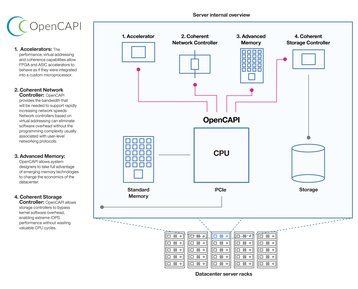A newly established consortium consisting of some of the world’s largest manufacturers of silicon chips has released specification for a server expansion technology that promises to be much faster than PCIe.
OpenCAPI is a hardware standard originally developed by IBM that puts compute power closer to the data and can be used to connect components like new types of memory, GPU accelerators, and networking and storage controllers.
The OpenCAPI Consortium claims that in specific use cases, it could increase the performance of servers tenfold.
The technology is supported by chip vendors including AMD, IBM, Mellanox Technologies, Micron, NVIDIA and Xilinx, as well as server manufacturers like Dell EMC and Hewlett Packard Enterprise. However it lacks participation of Intel – the world’s largest maker of CPUs.
The first OpenCAPI-enabled products are expected in second half of 2017.
Coalition of the willing
According to the OpenCAPI Consortium, many technology companies have developed innovative server solutions that cannot be leveraged effectively due to limited legacy interfaces. These include Storage Class Memory (SCM), Field-Programmable Gate Arrays (FPGAs) and GPU accelerators like Nvidia’s Tesla or AMD’s FirePro.
OpenCAPI is capable of delivering low latency and 25Gbps of bandwidth, easily outperforming PCIe, which maxes out at 16Gbps. The open standard will be available to the public at no cost before the end of the year.
“IBM first introduced CAPI technology to the industry in 2014 with our POWER8 processor and made it available to our OpenPOWER partners. Since then, the industry has embraced and validated its potential as a game-changing technology for the most important modern workloads including artificial intelligence, advanced data analytics and deep learning,” said Brad McCredie, IBM Fellow and Vice President of Power Development.
“As a result of this initial success, IBM has decided to double down on our commitment to open standards and enablement of industry innovation by opening up access to our CAPI technology to the entire industry.”
IBM plans to introduce Power9-based servers that leverage the OpenCAPI specification in the second half of 2017.
Meanwhile Google and Rackspace are collaborating on a Power9 server codenamed Zaius, which will also feature OpenCAPI. Mellanox plans to enable the new specification capabilities in its future products, and Xilinx plans to support OpenCAPI enabled FPGAs.
Interested parties can register and download the specification directly online. Companies with plans to develop products based on OpenCAPI may do so by either joining the Consortium – which has an open membership structure - or obtaining a relevant license.
The organization will also provide reference designs, further documentation and access to work groups.

